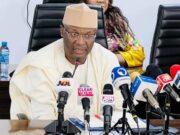 The Economic and Financial Crimes Commission (EFCC) has pushed back against growing calls for its dissolution, with 16 state governors currently in court challenging the agency’s legality.
The Economic and Financial Crimes Commission (EFCC) has pushed back against growing calls for its dissolution, with 16 state governors currently in court challenging the agency’s legality.
The Director of Public Affairs of the EFCC, Wilson Uwujaren, stated that Nigeria’s survival depends on the anti-graft commission, given the country’s deep-seated corruption issues.
 Advertorial
Advertorial
Speaking on Channels Television’s The Morning Brief, Uwujaren expressed disbelief at the legal actions taken against the EFCC.
“Nigerians need to see through these antics and resist it because without the EFCC, Nigeria cannot survive the level of corruption we’re dealing with,” he emphasized.
Uwujaren suggested that the individuals behind the challenge are attempting to escape accountability.
“I don’t think the EFCC is the primary issue for citizens in those states,” he remarked.
 Advertorial
Advertorial
“What’s really happening is that certain people are feeling the pressure from the EFCC’s work and want to derail its operations.”
He also stressed that the establishment of the EFCC is legally sound, and efforts to challenge its existence are aimed at undermining the fight against corruption.
“Those who are pushing this agenda want to kill the EFCC and stop transparency and accountability in their regions,” Uwujaren added.
 Advertorial
Advertorial
The controversy comes after 16 governors, led by the Kogi State Government, filed a lawsuit at the Supreme Court, contesting the agency’s constitutionality.
The states involved in the suit include Ondo, Edo, Oyo, Ogun, Nasarawa, Kebbi, Katsina, Sokoto, Jigawa, Enugu, Benue, Anambra, Plateau, Cross River, and Niger.
The case is scheduled for hearing on October 22nd.

However, legal experts like Femi Falana, a human rights lawyer, have criticized the move.
Falana argued that the EFCC, along with other anti-corruption bodies like the Independent Corrupt Practices Commission (ICPC) and the Code of Conduct Tribunal, is essential to Nigeria’s fight against corruption.
He advocates for reforms to ensure these institutions operate independently of government control.
 Advertorial
Advertorial
Olisa Agbakoba, a Senior Advocate of Nigeria (SAN), holds a different view, asserting that the EFCC’s establishment is unconstitutional.
In letters to the National Assembly, Agbakoba argued that the powers granted to the EFCC exceed the limits of the National Assembly’s authority.
“I strongly believe the EFCC is an unlawful organization, and I am pleased that many states are challenging its constitutionality,” Agbakoba stated.

















